Smooth Life Stage Changes with NDIS Support: Plan Ahead and Thrive with Confidence
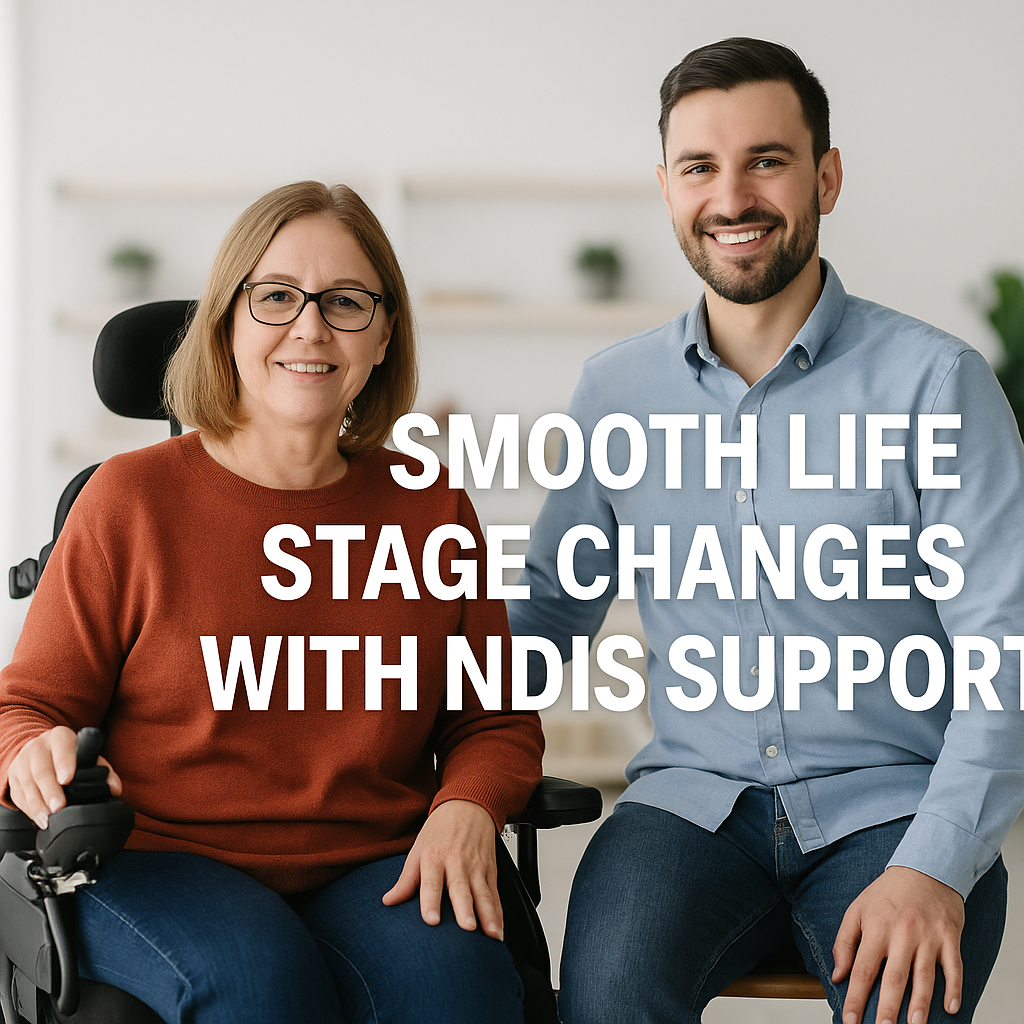
The Hidden Weight of Change—and How to Lighten It
Life doesn’t slow down just because your plate is full. One moment everything feels steady, and the next you’re staring down a huge shift—finishing school, moving house, starting a new job. Suddenly, it feels like the ground is sliding out from under you, and the only thought racing through your head is: How am I supposed to keep up with this?
And let’s be real—it’s exhausting. Not the kind of tired a nap can fix, but the kind that seeps into your bones, weighs on your chest, and clouds your head. Every form to fill out, every appointment to keep, every phone call to make feels like another brick on your back. Maybe you’ve even whispered to yourself, I can’t do this anymore.
If that’s you, hear this: you’re not broken. You’re human. You’ve been carrying too much for too long. It’s no wonder you feel like you’re drowning while everyone else keeps telling you to “just keep swimming.”
A Better Way Forward
But here’s the truth—life stage changes don’t have to be chaos. You don’t have to grip the steering wheel with white knuckles or simply hope it all works out. With the right plan and the right support, those overwhelming changes can shift from stumbling blocks into stepping stones.
That’s the real purpose of the NDIS. It’s not meant to be a mountain of paperwork—it’s a bridge, helping you move from where you are now to where you want to be.
This isn’t about empty pep talks or pretending life is simple. It’s about giving you something real—practical, doable steps that bring clarity and confidence. So instead of lying awake at night, trying to figure it all out on your own, you can finally breathe and say: I’ve got this.
If what you’ve been craving is clarity, confidence, and a little peace of mind, you’re in the right place.
So, let’s cut through the noise, quiet the overwhelm, and walk into a new way of planning that actually works.
Ready? Let’s begin.
Section 1: When Life Shifts: The Emotional Weight of Change

Life stage changes aren’t just dates on a calendar—they’re the moments when your whole world shifts shape. Finishing school. Moving into your first place. Starting work. Losing work. Entering adulthood. Facing the realities of ageing.
These aren’t just “events.” They ripple through every corner of life—emotional, social, physical, and financial.

Take James, for example. He had just finished high school. For years, the school system was his safety net—teachers, aides, and the comfort of routine. Then suddenly, it was gone. The question wasn’t just What’s next? But am I ready? His mum described it as stepping off a moving bus without knowing where the road ended. The silence after that final school bell rang louder than all the years of classrooms combined.
Or consider Anna, who had lived with her parents all her life. Moving into supported accommodation sounded exciting—freedom, independence, her own space. But on the first night in her new room, the silence pressed in. The walls were unfamiliar. The smell of her mum’s cooking was gone. Independence didn’t feel like freedom—it felt like loss. She lay awake wondering; Did I make the right choice?
These moments show the true emotional weight of life stage changes. It’s not only about logistics or paperwork. It’s about identity, security, and a sense of belonging.
When life shifts, the questions come fast: Will I cope? Who’s got my back? What if I fail? And beneath it all is a quiet longing: I just want to feel okay in this new stage.
Here’s the good news—you don’t have to face those changes alone. With the right NDIS support, fear can give way to stability, confusion to clarity, and pressure to peace of mind.
👉 If you or someone you love is carrying the heavy weight of a big life change, call Livingstone Care Services today on 0411 199 001 or 4757 10503.
We’ll help you plan the next step so you can breathe easier and move forward with confidence.
Section 2: Why Conventional Approaches to Life Stage Changes Don’t Work
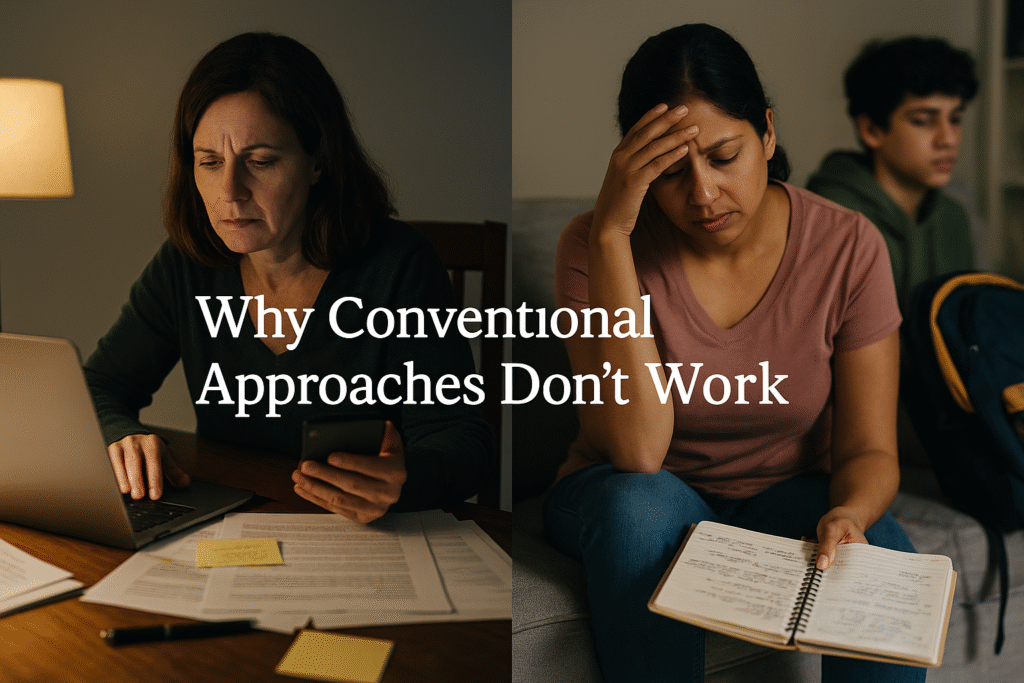
“We’ll Cross That Bridge When We Get There”
The most common way people handle life stage changes goes like this: wait until a problem shows up, scramble for solutions, patch things together, and hope for the best. On the surface, it sounds practical. In reality? It’s exhausting.
Take Sarah, a carer for her son Daniel. He was about to finish school when she suddenly realised—there was no plan for what came next. Panic set in. She called friends, scrolled through endless websites late into the night, and chased options that were already slipping away.
By the time she pulled something together, the deadlines had passed. Daniel missed out on a program that could have given him valuable job skills—simply because the application window had closed months earlier.
Or Michael, who waited until his father’s health declined before considering supported accommodation. In the rush, he accepted the first option available. It was far from family, and it didn’t suit his father’s needs. What could have been a smooth transition turned into a painful adjustment filled with regret.
Why does this happen? Because reacting keeps you stuck in survival mode. There’s no breathing space, no time to weigh choices, and no chance to prepare emotionally. It’s like trying to fix a leaking roof in the middle of a storm—you’re cold, stressed, and focused only on the next drip, not on building something secure.
DIY Planning Without Guidance
The other common approach is going it alone. Many people assume asking for help means weakness, so they push through by themselves. But the truth? Burnout creeps in. Resentment builds. And both carers and participants end up suffering.
Some families throw themselves into research—scrolling late into the night, guessing, Googling, piecing things together. Their intentions are good. But without expertise, they miss crucial details. On paper, the plan looks solid. In practice, the gaps show up quickly.
Priya, a single mum, thought she had carefully mapped out her son’s future. But when he turned 18, she discovered half the services she’d planned for didn’t even exist in their area. She sighed, “I thought I was being proactive. Instead, I ended up exhausted and starting from scratch.”
Why These Failures Hurt
Conventional methods fail because they are:
- Reactive – always playing catch-up.
- Rushed – leaving no time to think clearly.
- Isolating – making people feel alone in the process.
The result?
- Stress that could have been avoided.
- Peace of mind was stolen from families.
- Confidence eroded in the very people they’re trying to support.
No wonder so many feel overwhelmed. The truth is, conventional ways don’t just fail—they backfire.
💡 If any of this feels familiar, don’t wait for the next crisis. Book a life-stage planning session with Livingstone Care Services.
Together, we’ll make sure your future isn’t built on sticky tape and late-night panic, but on solid ground.
📞 Call 4757 10503 or 0411 199 001 to get started.
Section 3: From Chaos to Clarity: The Power of Proactive, Holistic Planning
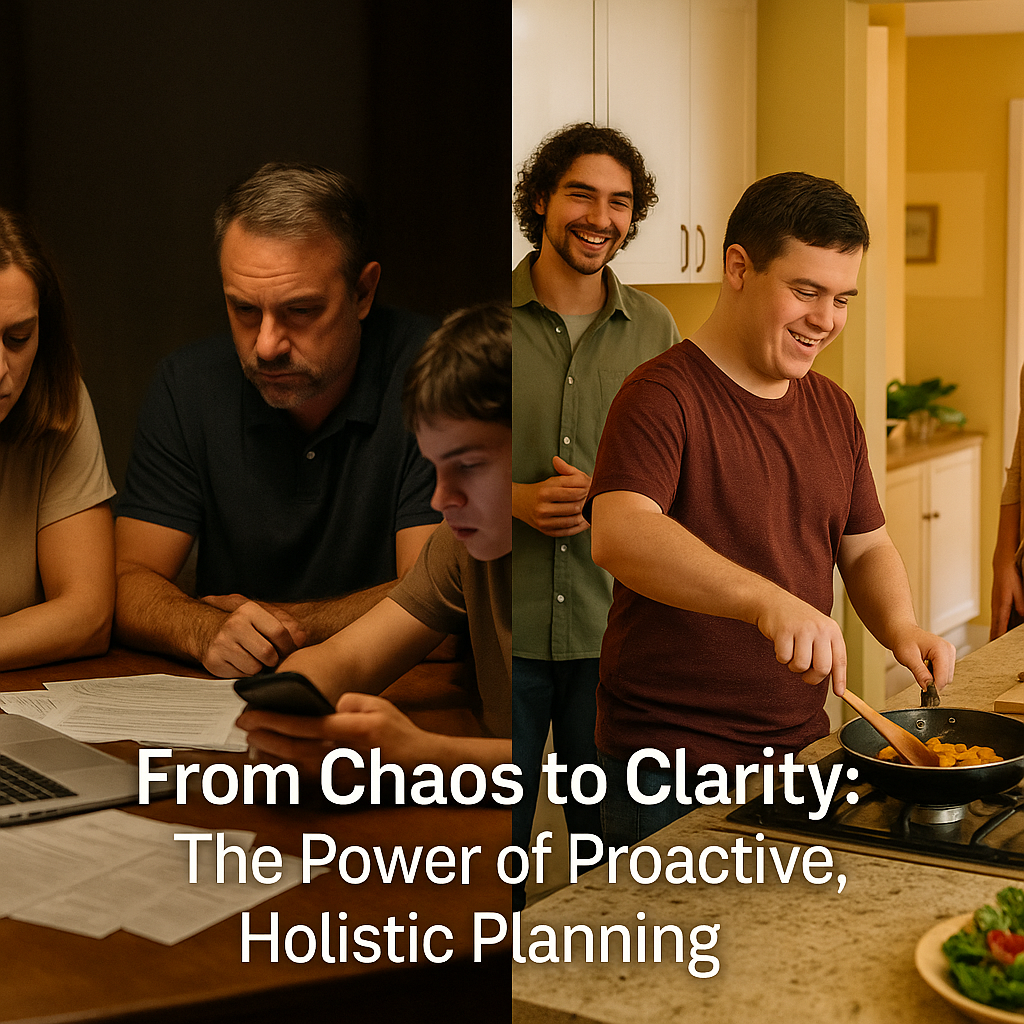
If the old way of handling life stage changes feels like building a house on sand, the new way is like pouring a solid concrete foundation before the storm hits.
Proactive planning means you don’t wait until the system forces your hand. You get ahead of it. You create a map instead of a vague idea. You see the whole picture, not just one corner.
What Does Holistic Really Mean?
Holistic isn’t just a buzzword. It means looking at every area of life that matters:
- Health – medical care, therapies, specialist access.
- Home – safe, stable, and suited to changing needs.
- Learning – school, training, or lifelong skills.
- Work – not just “finding a job,” but matching passions with opportunities.
- Community – friendships, activities, and belonging.
- Future Security – wills, guardianship, finances.
When these pieces connect, life feels smooth. When they don’t, it’s like trying to solve a puzzle with missing pieces.
Real-Life Story: Michael’s Turning Point
Michael was 22 and living with autism. His mum, Grace, had always managed things “on the go.” But when Michael began saying, “Mum, I want my own place,” panic set in. Grace thought, “He’s not ready. I’m not ready. How would this even work?”
A friend suggested proactive planning.
With a planner, they didn’t just talk about housing. They asked Michael about his favourite activities, routines, and friendships. Michael lit up when he talked about cooking. Suddenly, it became clear—he didn’t just want a house. He wanted a space with a kitchen he could make his own.
Six months later, Michael moved into supported accommodation with two others. Every Saturday, he cooked dinner for the house. Grace visited and said:
“I thought he’d sink. Instead, he’s thriving. And I can breathe again.”
What changed wasn’t luck—it was planning that treated Michael as a whole person, not just a problem to solve.
The Counterintuitive Truth
Here’s the surprising part: planning ahead actually gives you more flexibility, not less.
Some people resist because they fear being “locked in.” But the truth? Early planning expands your choices. It gives you time to adjust, adapt, and refine. Waiting until the last minute leaves you with only what’s left.
It’s like booking a holiday. Plan six months, and you can choose the hotel with the view, the flights that suit, and the activities you want. Leave it until the week before, and you’re stuck with leftovers. Why should life—or your loved one’s future—be any different?
A Tale of Two Families
-
Family One: The Reactive Route
The Johnsons waited until their son Daniel turned 18 to “see what he wanted.” Weeks slipped by. Daniel grew isolated, spending his days on his phone. Arguments flared at home. By the time they reached out, Daniel had lost confidence, and the options left were rushed and far from ideal.
-
Family Two: The Proactive Route
The Ahmeds also had a son nearing 18. But a year earlier, they sat down with a planner. Together, they explored Daniel’s passions—music and gardening. They mapped out training, volunteer work, and housing options. When graduation came, Daniel already had a plan. He joined a gardening program in the mornings and volunteered at a local music studio in the afternoons. His parents described him as “alive with purpose.”
Same life stage. Same challenges. The difference? Proactive, holistic planning.
Why This Approach Works
This new way works because it:
- Looks at the whole person, not just paperwork.
- Makes room for emotions—fear, hope, grief, excitement.
- Creates time to explore, test, and change direction.
- Involves others—family, friends, support coordinators, professionals—so no one carries the load alone.
The result? Life stage changes stop feeling like cliffs you’re pushed off. They start to feel like steps on a staircase. Still a climb, yes—but steady, safe, and possible.
💡 Don’t let your loved one’s future be shaped by last-minute decisions.
Book a life-stage planning session with Livingstone Care Services today. Together, we’ll look at the whole picture—not just one piece.
📞 Call 4757 10503 or 0411 199 001 to secure the future your family deserves.
Section 4: Facing the ‘What Ifs’ with Confidence: A Guide for Families in Transition
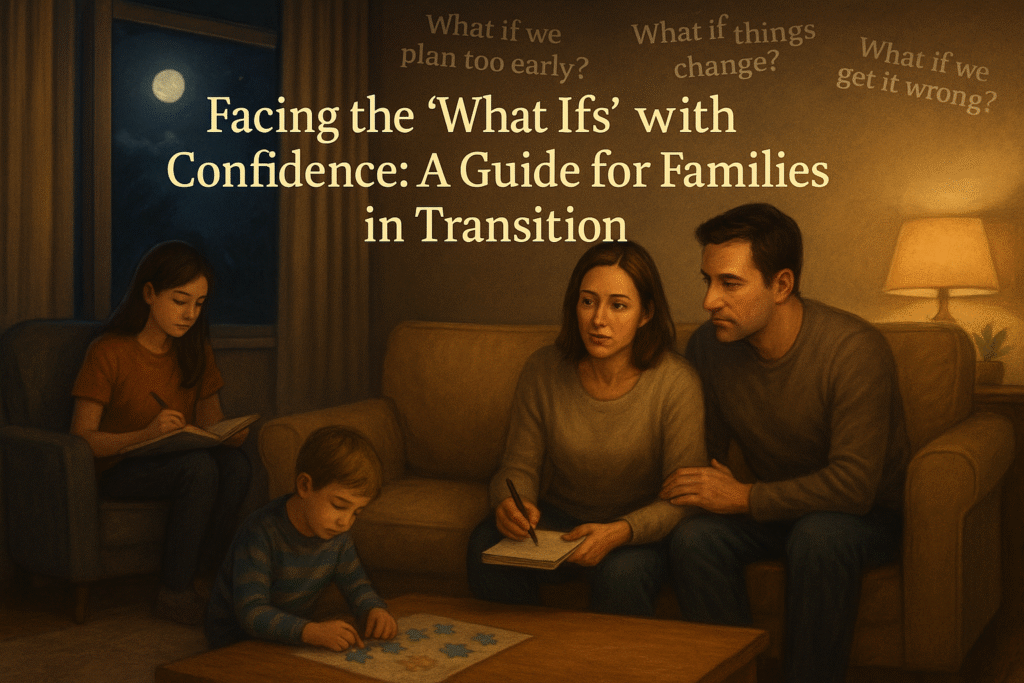
Every family knows the restless nights. The “what ifs” circle like buzzing flies:
- What if we plan too early?
- What if things change?
- What if we get it wrong?
These questions are real, and pretending they don’t exist only makes them louder. The way forward isn’t ignoring the fear—it’s facing it directly.
Fear 1: “What if we plan too early?”
Some parents whisper in quiet moments, “If I start now, am I tempting fate?”
The truth: early planning doesn’t trap you. It frees you. Think of planting a tree. Plant it young, and you can guide its growth—shape the branches, strengthen the roots. Wait too long, and all you can do is prune what’s already grown wild.
Sarah’s Story
At 16, Sarah’s mum began planning for adulthood. Friends said, “She’s still in school—why rush?” But together they explored Sarah’s passions: art, swimming, and animals. By 18, Sarah was volunteering at an animal shelter and enrolled in an art program.
Her mum reflected:
“People thought I was rushing. But now, Sarah isn’t falling into the gap after school—she’s flying over it.”
Fear 2: “What if things change?”
Life is rarely static. Needs shift, circumstances evolve. That’s why good planning isn’t a rigid contract—it’s a living roadmap, ready to bend when life bends.
Jacob’s Story
At 19, Jacob’s plan centred on supported employment. But by 21, his health changed, and full-time work became unrealistic. Because his family had built flexibility into the plan, they pivoted smoothly toward part-time volunteering, therapies, and community engagement.
His mum explained:
“If we’d waited until the crisis hit, we’d have been scrambling. Instead, we just turned the wheel a little.”
Fear 3: “What if we get it wrong?”
Planning isn’t about perfection. It’s about direction. Getting it “wrong” isn’t failure—it’s feedback. It shows you what doesn’t fit, so you can move toward what does.
Think of cooking: the first try might be too salty or too bland. You adjust, you add spice, and the meal still nourishes. The effort still counts.
The Maria Family’s Story
Maria’s parents mapped out a hospitality training plan. Six months in, Maria realised she hated it. Instead of despairing, her family saw it as a discovery. They shifted toward baking—her true love. Today, Maria runs a small home-based cake business, her laughter filling the kitchen as she decorates cupcakes.
Her dad said:
“We thought we’d wasted six months. But really, those six months opened the door to Maria’s passion.”
The Deeper Insight
Here’s the heart of it: most fears don’t come from reality—they come from the unknown. It’s the blank space on the map that feels scary. But once you start drawing in the details, the unknown shrinks, and so does the fear.
Planning doesn’t erase uncertainty. But it does make uncertainty less overwhelming. It hands you tools, options, and a steadying sense of control.
💡 Don’t let “what ifs” keep your family stuck. Take the first step toward clarity today. Book a life-stage-planning session with Livingstone Care Services.
📞 Call 4757 10503 or 0411 199 001—and turn fear into confidence, and uncertainty into direction.
Section 5: Beyond Survival: How Holistic Planning Helps Families Thrive
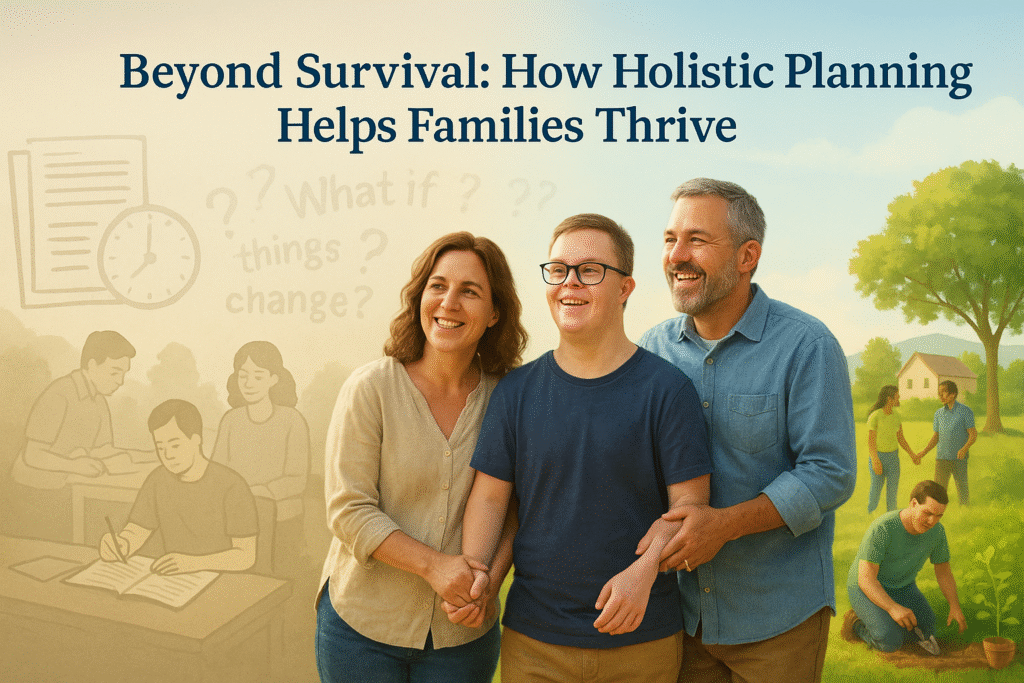
When families take the step into proactive planning, something shifts. The air feels lighter. Days don’t feel quite as rushed. Suddenly, there’s space—space to breathe, to dream, and to move forward with confidence.
Holistic planning isn’t just about ticking boxes. It’s about weaving all areas of life—health, education, work, relationships, and independence—into one strong safety net. And when one strand wobbles, the net is there to catch you.
Benefit 1: Stability in Uncertain Times
Life is unpredictable. A sudden hospital stay. A carer falling ill. An unexpected job loss. Without a plan, these moments feel like freefall. With a plan, the landing is softer.
Emma’s Emergency
Emma’s father had been her main carer for years. One morning, he collapsed from a stroke. The family was terrified—not only for him but for Emma. Who would step in?
Because they had a proactive plan, Emma’s support didn’t collapse with her father’s health. Within hours, trained staff arrived. Therapies continued. Meals were organised. Emma wasn’t left in chaos—she was held in stability.
Her sister later said:
“In the middle of our worst storm, Emma’s life carried on with surprising calm. That plan was our lifeline.”
Benefit 2: Building Confidence and Independence
Planning ahead creates space for growth. Instead of being thrown into independence overnight, skills are built gradually—like stepping-stones across a river. Each step is steady. Each step is confidence-building.
Liam Learns to Travel
Liam, a 20-year-old with autism, longed to travel on his own. His parents worried. What if he got lost? What if he panicked?
Through a staged plan, Liam began small—catching the local bus with a support worker, then travelling with a peer, and finally, by himself.
The day he called his mum from the bus stop saying, “I made it on my own!” she wept with pride. That plan didn’t just get Liam from Point A to Point B. It gave him freedom—and his parents peace of mind.
Benefit 3: Strengthening Families
A holistic plan supports not only the individual but the entire family. Parents stop feeling like they’re carrying the world alone. Siblings stop feeling overshadowed. Everyone can breathe again.
The Patel Family’s Balance
The Patels had three children, including Rina, who had Down syndrome. Without a plan, most of the family’s life revolved around Rina’s needs, leaving her siblings often feeling sidelined.
Holistic planning changed that. Respite care was scheduled. Rina began a life-skills program twice a week. She gained independence—and her siblings gained time to shine in their own sports and music.
Her brother said:
“It’s like we got our family back. We’re not just surviving anymore. We’re living.”
Benefit 4: Unlocking Hidden Opportunities
Planning ahead often uncovers doors you didn’t even know existed—grants, community programs, employment pathways—things overlooked in the daily scramble.
Hidden Talent in James
James was quiet and reserved, and his family assumed he wasn’t ready for work. But during the planning process, his love of gardening came to light. With the right support, James joined a local landscaping business.
Soon, he was coming home with dirt on his hands and pride on his face. His mum laughed:
“We never thought James could hold down a job. Turns out, he’s the best worker they’ve got.”
Without that plan, James’s gift might have stayed hidden.
The Core Truth
Proactive, holistic planning isn’t about controlling the future. It’s about creating a foundation so strong that when the winds blow—and they will—you bend but you don’t break. It’s about confidence. It’s about dignity. It’s about building a life that’s more than just coping.
💡 Why wait for life to throw the next curveball? Secure stability, confidence, and new opportunities today.
📞 Book a life-stage planning session with Livingstone Care Services: Call 4757 10503 or 0411 199 001 and start creating a future where you and your loved ones can thrive.
Section 6: Taking the First Step: How Families Can Begin with Confidence
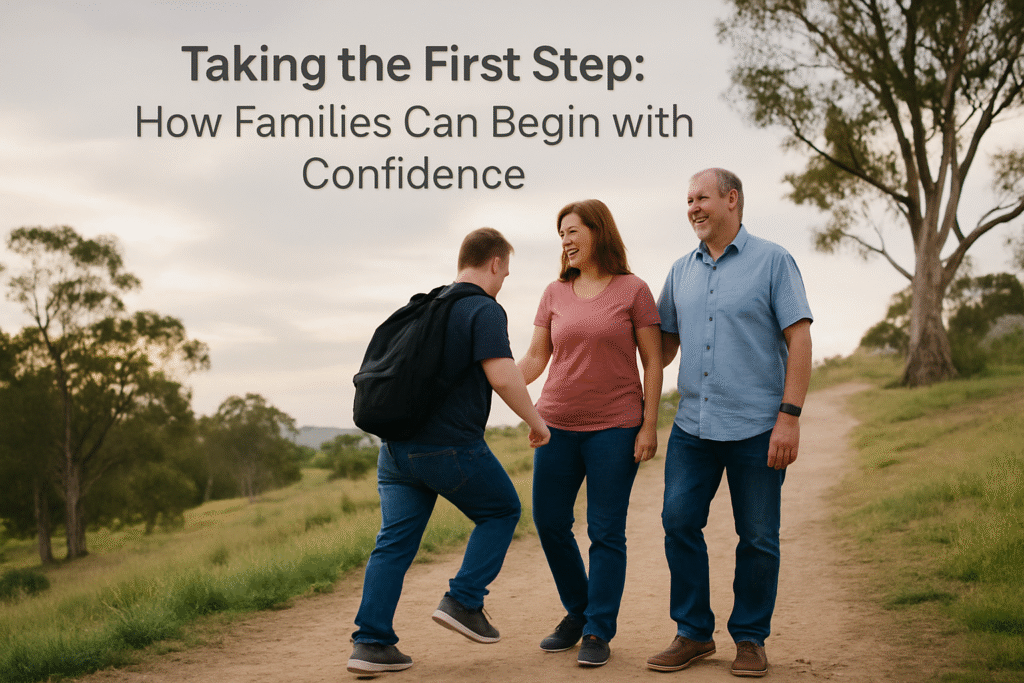
A big plan can feel overwhelming. Where do you even begin? The truth is, you don’t need to climb the whole mountain in one day—you just need to take the first step.
Here’s how families can move from hesitation to action.
Step 1: Start with Honest Conversations
Gather the family. Sit around the kitchen table with cups of tea and no distractions. Ask the hard questions:
- What’s working right now?
- What’s not working?
- What do we hope life looks like in five years?
- What scares us most about the future?
These talks can stir up emotions. Sometimes people cry. Sometimes silence hangs heavy. But honesty is the soil where strong plans grow.
Story: The Johnson Family’s Breakthrough
The Johnsons avoided “the future” for years because it felt too heavy. When they finally sat down together, the youngest son blurted out: “I just don’t want to feel invisible anymore.”
That one sentence changed everything. It made space for his needs to be heard alongside his sister’s. Their first step was simply realising every voice mattered.
Step 2: Seek Professional Guidance
You don’t have to figure everything out alone. NDIS providers and planners know the system—the forms, the funding, the pathways. They see possibilities you might miss.
Think of it like trekking a new trail. You could wander alone and risk dead ends—or you could walk with a guide who knows the safe bridges and hidden waterfalls.
Story: A Guide for the Roberts Family
The Roberts family had been drowning in paperwork. They’d even given up on claiming certain supports because it felt “too hard.” When they finally connected with a provider, the load lifted. The provider explained options clearly, handled the admin, and introduced programs they didn’t know existed.
The father later said, “We thought we had to do it all. Turns out, we just needed the right guide.”
Step 3: Build a Gradual, Flexible Plan
A plan isn’t carved in stone. It’s more like a map you redraw as life shifts. Start small. Add one piece at a time:
- Introduce respite care once a month.
- Join a local social group.
- Set a goal for skill-building, like cooking one new meal a week.
Bit by bit, those small steps create big changes.
Story: Maria’s Gentle Growth
Maria, a young woman with cerebral palsy, longed for independence but panicked at the thought of moving out. Instead of rushing, her family added small layers: first, cooking one meal a week. Then, she manages her own calendar. Later, staying overnight in short-term accommodation.
Each milestone built her confidence until, one day, she said, “I think I’m ready.” And she was.
Step 4: Review and Adjust Often
Life isn’t static. Needs evolve. A good plan grows with those changes.
Schedule regular check-ins—every six months, or whenever something shifts. Ask:
- Is this still working?
- Do we need to add or remove something?
- Has a new opportunity opened up?
Story: The Dynamic Plan of the Chans
The Chans had a strong plan for their son, Ethan. But when Ethan developed a passion for computers, everything shifted. They reworked his supports to include IT training and job-readiness programs. Today, Ethan isn’t just stable—he’s thriving in something he loves.
Step 5: Celebrate Wins Along the Way
Planning isn’t only about solving problems. It’s about creating joy. Celebrate every victory—no matter how small.
Tying shoelaces. Cooking a simple meal. Making a new friend. These aren’t just “steps.” Their life is being lived.
Story: A Toast to Small Wins
At the Nguyen household, every milestone comes with cake. When their daughter learned to order her own meal at a café, the family celebrated that night with candles and cheers.
Her mum smiled and said:
“Every small win deserves big love.”
The Gentle Reminder
Starting the process doesn’t mean you need everything figured out. It means you’re choosing to build a future on purpose, not by accident. One step at a time, with the right support, you move from fear to freedom.
💡 Take that first step today. Don’t wait until life forces your hand.
Book a life-stage-changing session with Livingstone Care Services and start shaping a future that grows with your family.
📞 Call 475710503 or 0411 199 001 to get started.
From Overwhelm to Confidence: Your Path Forward

Life never stands still. Children grow, parents age, and circumstances shift. Sometimes the pace feels gentle, like waves lapping on a beach. Other times, it crashes like a storm, leaving you scrambling for balance. Either way, transitions will come—and how you face them makes all the difference.
We’ve examined the traditional approaches—“winging it,” “waiting to see,” or doing everything on your own. Those paths often lead to stress, burnout, and missed opportunities. Then we uncovered a better way: planning ahead, choosing confidence over chaos, and allowing support to share the load.
Here’s the truth: thriving isn’t about avoiding change. It’s about meeting change prepared. It’s about having the right people in your corner. It’s about knowing you don’t have to figure everything out alone.
A Final Story: The Circle of Calm
Picture this: A mother stands at her son’s graduation. Tears blur her eyes as she recalls the years of struggle—fights with the system, sleepless nights, and lonely decisions. Yet, instead of exhaustion, she feels peace. Her son walks across the stage, confident and supported. She whispers, “We made it.”
That peace didn’t come by chance. It came through planning, wise choices, and reaching out for support at the right time. That is the power of preparing for life’s stage changes. That is what true support makes possible.
Your Next Step
You don’t need every answer today. You don’t need to map out the next twenty years in one sitting. You just need to start—one step that moves you from “someday” to “today.”
That step is within reach right now.
💡 Book your life-stage-changing session with Livingstone Care Services. Call 475710503 or 0411 199 001.
Let’s make sure your next chapter is defined not by fear or uncertainty, but by confidence, clarity, and peace.
About the Author
Anthony Langmartey
Anthony Langmartey is a skilled website manager, content writer, and email marketer with a passion for making an impact. He also serves as a Pastor, dedicated to guiding this generation with the word of God. Blending digital expertise with spiritual insight, Anthony is passionate about helping people find freedom, hope, and purpose through faith. His mission is simple: to use every tool — online and offline — to uplift lives and inspire transformation.


 9am – 5pm
9am – 5pm











